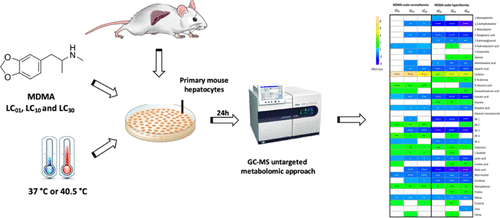当前位置:
X-MOL 学术
›
J. Proteome Res.
›
论文详情
Our official English website, www.x-mol.net, welcomes your feedback! (Note: you will need to create a separate account there.)
3,4-Methylenedioxymethamphetamine Hepatotoxicity under the Heat Stress Condition: Novel Insights from in Vitro Metabolomic Studies.
Journal of Proteome Research ( IF 4.4 ) Pub Date : 2020-01-23 , DOI: 10.1021/acs.jproteome.9b00741 Ana Margarida Araújo 1 , Maria Enea 1 , Eduarda Fernandes 2 , Félix Carvalho 1 , Maria de Lourdes Bastos 1 , Márcia Carvalho 1, 3 , Paula Guedes de Pinho 1
Journal of Proteome Research ( IF 4.4 ) Pub Date : 2020-01-23 , DOI: 10.1021/acs.jproteome.9b00741 Ana Margarida Araújo 1 , Maria Enea 1 , Eduarda Fernandes 2 , Félix Carvalho 1 , Maria de Lourdes Bastos 1 , Márcia Carvalho 1, 3 , Paula Guedes de Pinho 1
Affiliation

|
Hyperthermia has been extensively reported as a life-threatening consequence of 3,4-methylenedioxymethamphetamine (MDMA, ecstasy) abuse. In this work, we used a sensitive untargeted metabolomic approach based on gas chromatography-mass spectrometry to evaluate the impact of hyperthermia on the hepatic metabolic changes caused by MDMA. For this purpose, primary mouse hepatocytes were exposed to subtoxic (LC01 and LC10) and toxic (LC30) concentrations of MDMA for 24 h, at 37.0 °C or 40.5 °C (simulating body temperature increase after MDMA consumption), and alterations on both intracellular metabolome and extracellular volatilome were evaluated. Multivariate analysis showed that metabolic patterns clearly discriminate MDMA treated cells from control cells, both in normothermic and hyperthermic conditions. Metabolic signature was found to be largely common to MDMA subtoxic and toxic concentrations, although with evident differences in the magnitude of response, with metabolic changes significantly more pronounced at 40.5 °C. Discriminant metabolites associated with MDMA-induced hepatotoxicity are mostly involved in amino acids metabolism, aminoacyl tRNA byosynthesis, glutathione metabolism, tricarboxylic acid cycle and pyruvate metabolism. Moreover, our metabolomic findings were corroborated by classical toxicity parameters, demonstrating the high sensitivity of this omic approach to assess molecular-level effects. Overall, this study indicates that MDMA triggers significant metabolic alterations on hepatic cells, even at low concentrations, that are clearly exacerbated at high temperatures. These findings provide new metabolic pieces to solve the puzzle of MDMA's hepatotoxicity mechanism and emphasize the increased risks of MDMA abuse due to the thermogenic action of the drug.
中文翻译:

3,4-亚甲基二氧甲基苯丙胺在热应激条件下的肝毒性:体外代谢组学研究的新见解。
热疗已被广泛报道为滥用3,4-亚甲二氧基甲基苯丙胺(摇头丸,摇头丸)的致命威胁。在这项工作中,我们使用了基于气相色谱-质谱的灵敏的非靶向代谢组学方法来评估热疗对MDMA引起的肝代谢变化的影响。为此,将原代小鼠肝细胞在37.0°C或40.5°C下模拟亚毒性(LC01和LC10)和有毒(LC30)浓度的MDMA放置24小时(模拟MDMA消耗后体温升高),并且两者均发生变化评估了细胞内代谢组和细胞外挥发性组。多变量分析表明,在常温和高温条件下,代谢模式都清楚地将经MDMA处理的细胞与对照细胞区分开。尽管在响应幅度上有明显差异,但在40.5°C时,代谢变化明显更为明显,因此发现代谢标记在MDMA亚毒性和毒性浓度下基本上很常见。与MDMA引起的肝毒性有关的判别性代谢物主要参与氨基酸代谢,氨酰基tRNA的合成,谷胱甘肽代谢,三羧酸循环和丙酮酸代谢。此外,我们的代谢组学研究结果得到了经典毒性参数的证实,证明了该组学方法对分子水平效应的评估具有很高的敏感性。总体而言,这项研究表明,即使在低浓度下,MDMA也会触发肝细胞上显着的代谢改变,而高温明显加剧了这种改变。
更新日期:2020-02-07
中文翻译:

3,4-亚甲基二氧甲基苯丙胺在热应激条件下的肝毒性:体外代谢组学研究的新见解。
热疗已被广泛报道为滥用3,4-亚甲二氧基甲基苯丙胺(摇头丸,摇头丸)的致命威胁。在这项工作中,我们使用了基于气相色谱-质谱的灵敏的非靶向代谢组学方法来评估热疗对MDMA引起的肝代谢变化的影响。为此,将原代小鼠肝细胞在37.0°C或40.5°C下模拟亚毒性(LC01和LC10)和有毒(LC30)浓度的MDMA放置24小时(模拟MDMA消耗后体温升高),并且两者均发生变化评估了细胞内代谢组和细胞外挥发性组。多变量分析表明,在常温和高温条件下,代谢模式都清楚地将经MDMA处理的细胞与对照细胞区分开。尽管在响应幅度上有明显差异,但在40.5°C时,代谢变化明显更为明显,因此发现代谢标记在MDMA亚毒性和毒性浓度下基本上很常见。与MDMA引起的肝毒性有关的判别性代谢物主要参与氨基酸代谢,氨酰基tRNA的合成,谷胱甘肽代谢,三羧酸循环和丙酮酸代谢。此外,我们的代谢组学研究结果得到了经典毒性参数的证实,证明了该组学方法对分子水平效应的评估具有很高的敏感性。总体而言,这项研究表明,即使在低浓度下,MDMA也会触发肝细胞上显着的代谢改变,而高温明显加剧了这种改变。


























 京公网安备 11010802027423号
京公网安备 11010802027423号